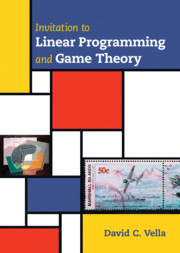Book contents
- Frontmatter
- Contents
- Preface
- Acknowledgements
- 1 Preliminaries
- 2 Matrix Algebra
- 3 Graphical Linear Programming
- 4 Sensitivity Analysis and Duality
- 5 The Simplex Algorithm
- 6 Game Theory
- 7 More Game Theory
- 8 Sensitivity Analysis, Ordinal Games, and n-Person Games
- 9 More Linear Programming
- Appendix A Rapid Review of Sets and Probability
- References
- Index
7 - More Game Theory
Published online by Cambridge University Press: 11 March 2021
- Frontmatter
- Contents
- Preface
- Acknowledgements
- 1 Preliminaries
- 2 Matrix Algebra
- 3 Graphical Linear Programming
- 4 Sensitivity Analysis and Duality
- 5 The Simplex Algorithm
- 6 Game Theory
- 7 More Game Theory
- 8 Sensitivity Analysis, Ordinal Games, and n-Person Games
- 9 More Linear Programming
- Appendix A Rapid Review of Sets and Probability
- References
- Index
Summary
We continue the study of constant-sum games by illustrating how to solve them if the payoff matrix is larger than 2 x 2.We derive the method of equalizing expectation to solve such games, Williams's method of oddments, and finally, we show how to solve any constant-sum game using linear programming. This provides us with a full proof of the minimax theorem. Also, using linear programming, we can prove the square subgame theorem, which states that the solution to any constant-sum game is the same as a solution to one of its subgames that has a square payoff matrix. We then illustrate how to use Microsoft Excel or Wolfram Mathematica to solve such games. In the final section of the chapter, we study variable-sum games and introduce the notions of payoff polygon and Pareto efficiency of an outcome. We show that not every such game has a universally accepted solution, so there is no analog of the minimax theorem for such games. In the 2 x 2 case, we show how to find a Nash equilibrium using mixed strategies if necessary (Nash proved that any game has one). However, the equlibrium point so obtained may not be Pareto efficient so may not be a good "solution" to the game.
Keywords
- Type
- Chapter
- Information
- Invitation to Linear Programming and Game Theory , pp. 301 - 351Publisher: Cambridge University PressPrint publication year: 2021

